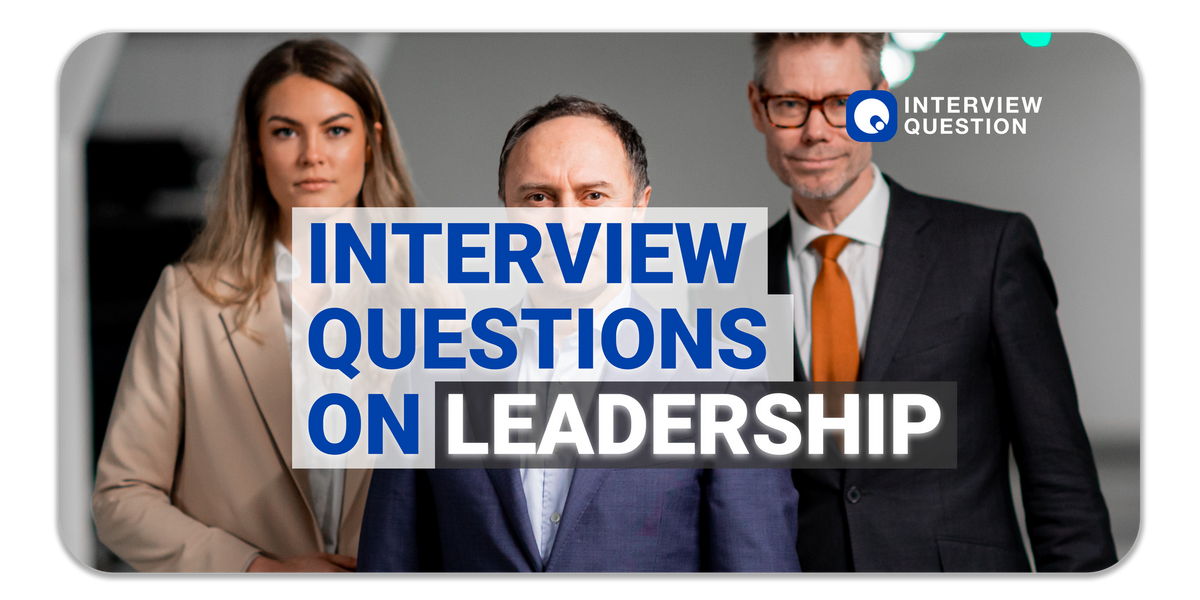Interview Questions on Leadership
Ever wonder what interview questions on leadership you could be asked? Check out this list of popular leadership questions and how to answer them.

It takes courage to be a leader. You're expected to inspire those around you and bring out the best in yourself. When it comes to interviewing for leadership roles, most interviewers have some very basic questions that they ask.
Are you a leader? Do you want to be a leader? If you answered yes to either of these questions, then you need to know what kind of leadership interview questions to expect. Leadership is one of those qualities that everyone seems to think they have, but only a few actually do. And when it comes time for an interview, many people don’t know how to answer leadership questions.
In this article, we'll teach you how to answer these tough questions and ensure that your next interview is a success!
Question 1: What do you think are the most important leadership qualities?
A good leader should show courage and confidence. Courage enables you to take risks in order to reach goals and make future-oriented decisions. Confidence is needed in order to persuade others that your plans will work. A good leader should also be selfless and willing to take the blame when things go wrong.
Question 2: What are some of the major challenges or issues facing leaders today?
The increasing workload, unrealistic deadlines, and constant change are some of the biggest challenges leaders face. Today's leaders must be able to pick up new skills quickly and deal with new problems. They also must have deep technical knowledge of their business, including its big picture and day-to-day details.
Interview examples here should be as detailed as possible.

Question 3: How can you lead others to give their best?
Leaders need to inspire others. They make everyone feel that they can do better than their current performance, and they give them the right goals to work for.
Leaders should identify the qualities and abilities of their employees and be willing to give them opportunities to see themselves as capable, vital, and committed. Most managers have clear-cut goals for an individual's performance. But when it comes to team goals, it's a different story. You can't set a set of targets on your team members. You'll need to adjust your expectations based on the type of work they do and their capabilities.

Question 4: In 3 words, how will you describe your own leadership style?
Creative, committed, and challenging. Though some may like to be told what to do, others need to have the opportunity to choose and the chance to fail. This ensures that they are committed. In order to be creative, you need to have the capacity to see things differently than other people and your vision should be inspired by your real needs or future goals. Next, you need to be committed – you need to show that you love what you do and that it's important enough for you to stay with it for many years. Finally, challenges should be the driving factor for your goals. If you want something, you have to get it yourself, and in most cases, it is not easy to get what you want, the way you want it and at the speed you demand.
I am a proactive, outgoing leader who is responsible, intelligent and dedicated to my job. I'm a good team player who can work independently and in many different environments. I enjoy problem-solving and communicating with diverse groups of people. I do not only like to give orders; instead, I believe in setting goals, encouraging my team members and giving them the necessary resources to achieve those goals.
Question 5: What is the difference between a good leader and a bad one?
A good leader is hard-working and enjoys doing what he or she does. A bad leader thinks he or she knows everything and often tries to control things, whereas a good leader lets others do their jobs without interfering. A bad leader may be lazy and inattentive, placing the blame on others. Knowing what type of leader you are today is the first step to change.
Question 6: If you were given an impossible task, how would you handle it?
One way would be to go back and find a different approach so that I can complete the task. Another way is to ask for help from the people around me. Different opinions give perspectives on how to deal with a situation - a problem impossible to me may not be one to another person.
Question 7: What kind of leader are you and why?
I'm not sure that I am a great leader. I think it depends on the situation. In some offices, my leadership skills are more apparent than in other settings, where I am more passive. Being part of a team, trying to resolve problems and create new solutions is what motivates me most of all. Being absolutely honest with myself and the people who work with me is very important, too; it shows I am human, like they are and not someone who thinks he knows everything. This is the best way to create healthy relationships and a productive work environment.
Question 8: Who was the most influential leader you have known?
The most influential leader I have known so far is my father. As a parent, he had a lot of responsibility. He and his wife sacrificed a lot for my sister and I to get an education - we moved to another country - and start working. His leadership style was very different from mine, but I try to incorporate some of the things he taught me in this area in my everyday activities.
Question 9: How would you build a team?
Teamwork is the key to success. One of the things that an interviewer will look for is a collaborative approach among the team members. A good manager is able to recognize and capitalize on each employee's individual strengths and weaknesses – and then build upon them to overcome challenges. It's important to build a team that can work effectively together.
Question 10: If you were the CEO, what changes will you make?
Every leader has a vision for the future and can see the big picture. They're able to strategize on how to achieve their goals and then present it as an achievable timeline to everyone else in the team. If I am the CEO, I would try to make the company a better place to work, not only with positive reinforcement but also by making it a fun place. A bigger office space, better facilities – these are all perks that motivate people to do more and perform better. I would certainly want them to enjoy their workspace and each other's company.
Question 11: What does it take to be a successful leader?
A successful leader is someone who is able to develop himself – both through experience and education – over time. He or she is able to grow with his or her organization, adaptability, resilience, and flexibility. A few qualities that help define good leadership are initiative, judgment, responsibility, and reliability. These qualities are important because they help one to move forward, make the right decisions and have the perseverance to see projects through.
Question 12: How would you define a poor leader, what are some things that make them poor leaders and why?
A poor leader can be someone who is not able to motivate others or someone who always blames others for his or her mistakes. Good leadership starts with oneself. This means a leader is responsible for their own actions and therefore should act accordingly. Poor leaders give off the wrong signals when they are not able to manage their teams effectively.
Question 13: What kinds of skills are necessary to be a good leader?
A good leader must possess the qualities that make people want to work under him or her, such as enthusiasm, confidence, open-mindedness, honesty, communication skills and the ability to compromise. A good leader must also have the ability to give and take advice. A true leader is not afraid to show weakness and admit he or she was wrong in certain situations.
Question 14: What are some things that you've done recently to improve as a leader?
I've been consistently trying to improve my leadership skills by looking at what others do and trying to incorporate their practices into my own. I always try to be open to change, and I've been trying to implement these changes. I've also tried taking a step back from time to time, looking at what I've accomplished as well as what I could improve on. Sometimes just thinking about this from a distance helps me see things differently than when surrounded by all the stuff that day-to-day life entails.
Question 15: What is the difference between a boss and a leader, which one do you prefer to be and why?
A boss dictates orders while a leader motivates others to act. I prefer being a leader. I like being able to motivate my team members and inspire them to do their best work every day. An effective leader has the listening skills and the ability to help people do better at what they're doing now: giving advice, but not nagging or pushing them around. Rather than in the commanding position, the leader guides the team to a higher state of performance.

